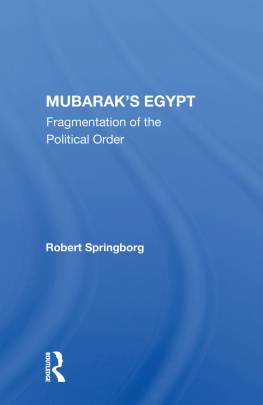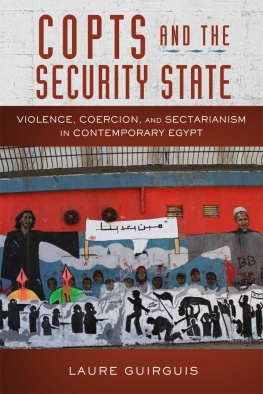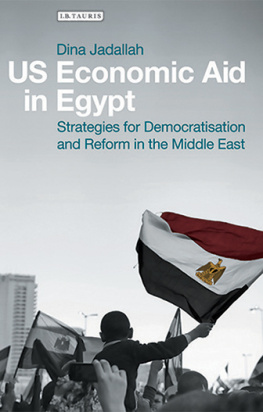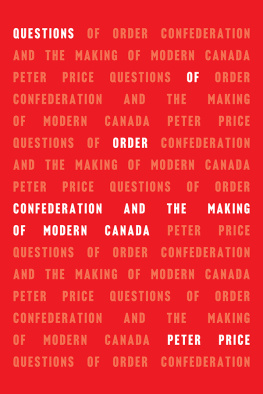MUBARAK'S EGYPT
Mubarak's Egypt
Fragmentation of the Political Order
Robert Springborg
First published 1989 by Westview Press, Inc.
Published 2018 by Routledge
52 Vanderbilt Avenue, New York, NY 10017
2 Park Square, Milton Park, Abingdon, Oxon OX14 4RN
Routledge is an imprint of the Taylor & Francis Group, an informa business
Copyright 1989 Taylor & Francis
All rights reserved. No part of this book may be reprinted or reproduced or utilised in any form or by any electronic, mechanical, or other means, now known or hereafter invented, including photocopying and recording, or in any information storage or retrieval system, without permission in writing from the publishers.
Notice:
Product or corporate names may be trademarks or registered trademarks, and are used only for identification and explanation without intent to infringe.
Library of Congress Cataloging-in-Publication Data
Springborg, Robert.
Mubarak's Egypt: fragmentation of the political order/Robert Springborg.
p. cm.
Includes index.
ISBN 0-8133-7643-2
1. EgyptEconomic policy. 2. EgyptPolitics and government1981- I. Title.
HC830.S68 1989
338.962dc19
88-11096
CIP
ISBN 13: 978-0-367-01275-5 (hbk)
The bulk of the field research on which this book is based was conducted in Egypt in 1986. It was made possible by a grant from the National Endowment for the Humanities administered by the American Research Center in Egypt, and by further assistance from Macquarie University. I would particularly like to thank Paul Walker, Richard Verdery, and Robert Betts of ARCE for facilitating the smooth transition from a southern to a northern hemisphere academic year and for assisting me and my family while we were in Cairo.
Having first become enamored of Egypt while working as a front desk clerk in an international hotel in Cairo in 1965, I have over the years accumulated an enormous debt of gratitude to innumerable Egyptians. Ahmad Fawzi and Ali Darwish, close friends of mine for more than twenty years, have made me feel as much at home in their country as in mine by sharing their knowledge of Egyptian society and politics with me. Others with whom I have been in contact over the years and who facilitated this and other projects include Adil Hussain, Tahsin Bashir, Hilmi Murad, and Sayed, Omar, Nasr, and Hassan Marei. Sayid Yassin and Salama Ahmad Salama, both of al-Ahram, generously shared with me their insights into contemporary events. Various members of the Ministry of Foreign Affairs, including Muhammad Assim, Badair Ghamrawi, and the recently deceased Salah Hindawi, assisted and encouraged this project at various stages. Sayid al-Kholi, also of that ministry, has not only taught me a great deal about the Egyptian political economy but has also provided documentation and other assistance that was vital to this endeavor. He was also the first to read an early draft of the manuscript, correcting numerous errors and encouraging me to push on. I have also benefited from interacting with various Egyptian academics. Ali Dessouki, Assim Dessouki, and Ibrahim Soliman have been particularly helpful. To all of these warmhearted, hospitable men I would like to express my deepest appreciation.
Various individuals employed in western institutions in Egypt were also of great help to me. Sylvia Mitchell, director of the Development Information Center of USAID, guided me professionally through the labyrinth of the Center's extremely useful collection. William Janssen, Ken Weigand, and Robert Mitchell, also of USAID, spent many hours describing to me the nuances of USAID-Egyptian government relations. Nicholas Hopkins, Enid Hill, and Walid Kazziha of the American University in Cairo provided useful insights into several policy issues. Hamilton McMillan of the British Embassy and Peter Rogers of the Australian Embassy instructed me on numerous occasions on contemporary events. Lee Travers of the Ford Foundation was both a stimulating and informed professional colleague and an ideal landlord. Ron and Anne Wolfe of Professional Business Services introduced me to a great many of the prominent personages with whom they have established close rapport and shared with me their unequalled knowledge of the inner workings of the Egyptian professional and business worlds. More than anyone else they ensured that a year in Cairo was for all members of my family a rewarding and unforgettable experience.
Bent Hansen, Clement Henry, George Lenczowski, and John Waterbury stimulated my thinking about numerous aspects of Egypt's contemporary political economy and read part or all of the manuscript. I would also like to thank Jim Bill, Ira Lapidus, and Yahya Sadowski for having read and commented on the manuscript. General Fakhr, a member of Field Marshal Abu Ghazala's staff, provided useful verbal and written comments on a draft of .
Helma Neuman of Macquarie University and Kate Herman, Nadine Zelinski, and Micky Skronski of the University of California at Berkeley overcame the obstacles of interpreting my rough drafts and integrating three highly idiosyncratic computer systems while processing the manuscript in a timely and professional manner. The Institute of International Studies and the Department of Political Science of UC, Berkeley, generously provided computer time and staff assistance, for which I would particularly like to thank Bent Hansen and Ken Messerer.
An abbreviated version of appeared as "The President and the Field Marshal: Civil-Military Relations in Egypt Today," in, MERIP Middle East Report 17, 4 (July-August 1987), pp. 4-17. I would like to thank the publishers of that journal for their permission to republish some of that material here.
Lastly, my wife, Patricia, who turned to good purpose a year in Cairo by researching and writing a book on the Pharaonic origins of kingship, was as always my greatest supporter and most perceptive critic. Our sons Ziyad and George bore up admirably under the strain of having two obsessed parents. To their credit both managed to carve out their own spheres of competence and to develop respect and appreciation for the country and its people. To Patricia, Ziyad, and George this book is dedicated.
Robert Springborg
The method of transliteration is geared primarily to the interests of readers not proficient in Arabic. No diacritical marks have been used and the Arabic letter ayn has not been represented by a single quotation mark as is commonly the case, except in the term gama'at, which is its typical spelling in the Western press. The vowels "e" and "o" appear only in those place names relatively familiar to Western readers (e.g., Beni Suef); in proper names of authors published in the West or of prominent persons (e.g., Heikal, Marei, Nasser); and in place of the dipthong "aw" in the case of the Cairo newspaper, Akhbar al-Yom. The doubled ya appears as a single "y" (e.g., Minufiya, not Minufiyya; Sayid, not Sayyid). Plurals are formed by adding to the italicized singular (e.g., imam-s ) . The jim, which is pronounced as a hard "g," is represented by "g" except in the word jihad, which is its most common spelling in the West. Uthman is rendered as the more common Osman, Umar as Omar, Quran as Koran, and Muslim as Moslem.
1
Egypt Confronts the New Orthodoxy of Development
As one of the world's great riverine civilizations, Egypt has like a magnet attracted powerful states endeavoring further to expand their influence. The great powers and their successors, including since the Napoleonic invasion of 1798 the French, British, Russians, and now the Americans, have sought to remake the Egyptian political economy according to a distorted, dependent, mirror image of their own. The French mission civilisation, undertaken by Napoleon and his countrymen who followed, was too abbreviated to restructure the economic foundations of the state, although Egyptian elites continued to imitate French culture long after France's paramountcy had waned. The French language and accompanying behavioral style afforded some defense, however symbolic and psychological, against the reality of British hegemony. For their part the British succeeded in establishing an export-oriented agricultural economy presided over by a semifeudal notability and aristocracy, arrangements that satisfied British economic demands and accorded with English perceptions of the politically right and proper. Three-quarters of a century later the Soviets exported a pale image of their "scientific socialism," which was reerected along the Nile in the form of Gamal Abdel Nasser's Arab Socialism. The Nasserite political system, with its emphasis on the single party, was made in the 1960s to conform stylistically, if not substantively, with the Leninist model. U.S. efforts since 1974 have contributed to the emergence of an economy with some recognizable neoclassical elements, while a version of political democracy has sent down a few tentative roots.









